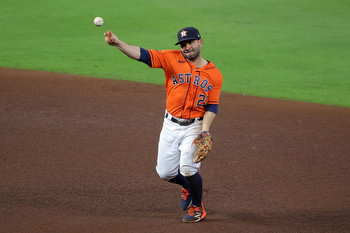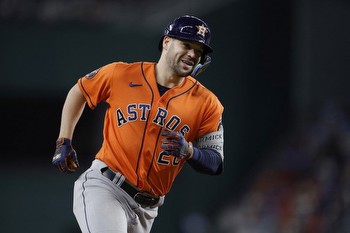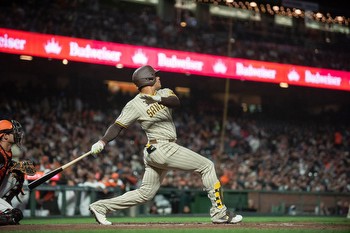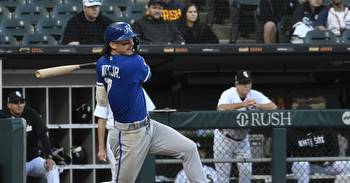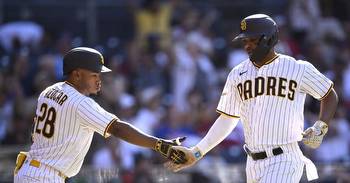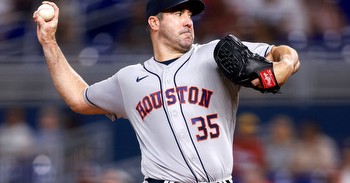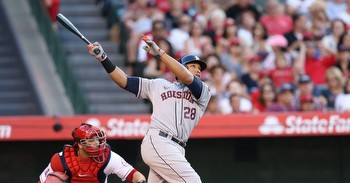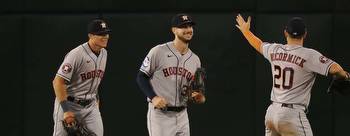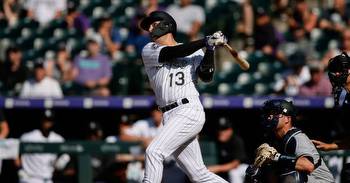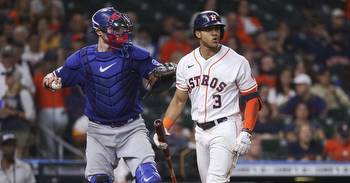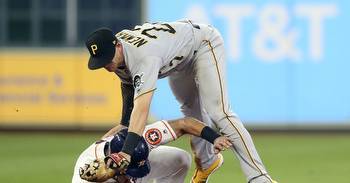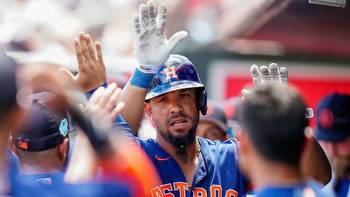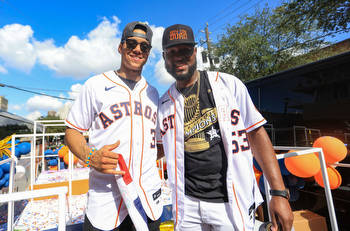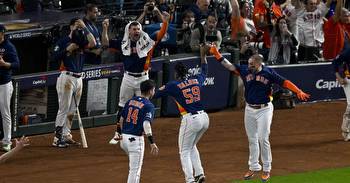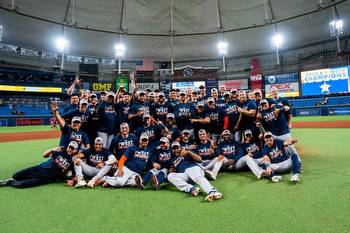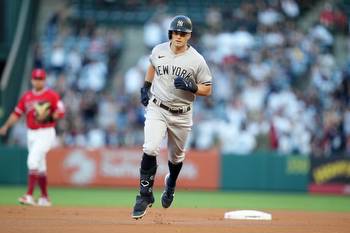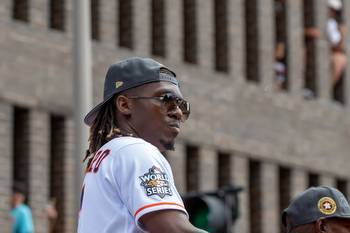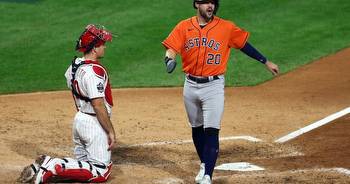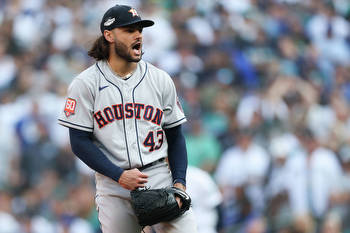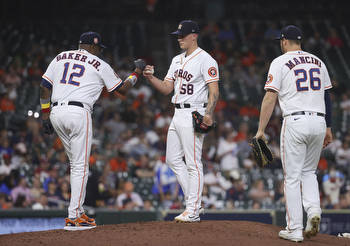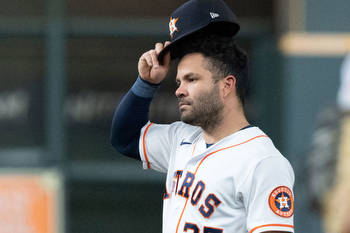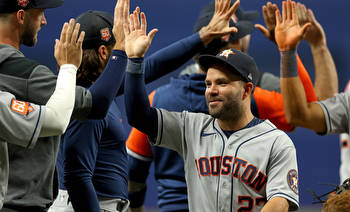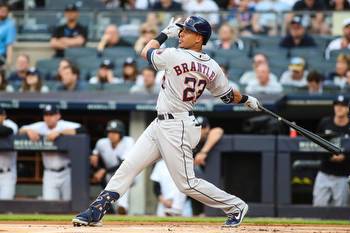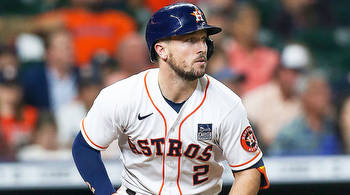Chas McCormick Has Become Indispensable for the Houston Astros
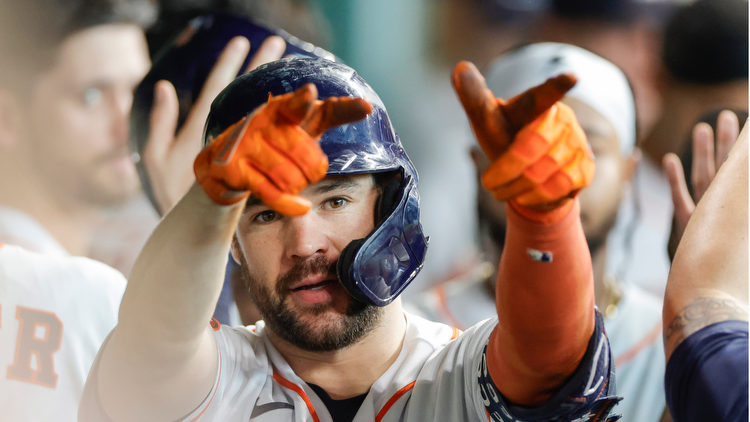
The first time Jason Kanzler watched Chas McCormick take batting practice, the Astros hitting coach knew he was looking at a power hitter.
It was the spring of 2019, and Kanzler had just joined the organization as a minor-league coach. He was not aware of McCormick, and there was little reason he should have been. Two years earlier, the Astros had drafted the outfielder in the 21st round out of Division-II Millersville University, signing the college senior for just $1,000. And McCormick was just now coming off his first full professional season, having slugged only .373. He was not, as they say, a dude.
But Kanzler was struck by how well the young right-handed hitter moved in the box. Solidly built at 6-foot and 208 pounds, McCormick had the frame to produce some pop. Kanzler approached with a get-to-know-you question: “Do you hit a lot of home runs?” McCormick laughed. The season before, he’d collected just four in 120 games. “No,” he told the hitting coach. “I have no power.” But that notion hit Kanzler like a stink bomb.
“That’s bull----,” Kanzler replied. “You’re going to hit for power.”
These days, McCormick indeed hits for power.
He enters Houston’s playoff series against the Twins having batted .273/.353/.489, his 22 home runs the fifth-most on a star-studded team. A solid hitter before — McCormick posted a 109 OPS+ in his first two big-league seasons, with 14 home runs each year — the 28-year-old has leveled up in 2023. By Baseball-Reference’s version of Wins Above Replacement, he has been Houston’s fifth-most valuable player. The Astros, who won their division by a game and avoided missing the playoffs by just two, would not have made the postseason without him.
He's exactly the type of success story Houston has become so good at forging, although McCormick has traveled a longer road than most. He may be an Astro now, but he was once explicitly not good enough for them. As a junior at Millersville, he hit .412 and hoped to go in the 2016 draft. On the event’s third day, a Houston scout called to ask if he’d sign for $50,000 in the 25th round. McCormick gave his enthusiastic assent, but the round came and went without his selection. So did the rest of the draft.
“I was obviously butthurt and upset,” the outfielder said, but he channeled that frustration into his performance. The next year, he posted a college career-best 1.033 OPS and boosted his homer total from two to nine. The draft came around again, and so did the Astros. This time, they offered just a grand to sign in the 21st round, a reflection of the senior’s lack of leverage. Despite the theoretical pay cut of $49,000, McCormick was quick to forgive.
“At that point,” he said, “I was just happy to get drafted.”
That hardly guaranteed his ascent to the majors. He was among the longest shots. Every pick ahead of him was a bigger priority, as were scores of other players already in the system. “It’s kind of like, ‘Good luck, we don’t have much faith in you,’ ” McCormick said. “But you get a chance.” McCormick did something with it. By 2019, he’d reached Triple A, posting a solid batting average and hitting for a bit more damage. By 2021, he was in the majors, where he quickly proved to be a productive hitter, especially against lefties.
Once slow to buy in, the Astros suddenly committed hard. At the 2021 trade deadline, Houston made a surprising swap, flipping center fielder Myles Straw to Cleveland for reliever Phil Maton and a prospect. As much as that deal was about the return — Maton is now a key bullpen piece, and the prospect was Yainer Diaz, who has been another dangerous bat for the Astros this year — it was also about McCormick. Straw had been Houston’s replacement for homegrown All-Star outfielder George Springer. Now the Astros, at the direction of then-general manager James Click, were entrusting that job to a rookie who was drafted in a round that no longer exists.
“Oh crap,” McCormick remembers thinking, “is this my gig?”
Although it took some time for McCormick to grow into the role, he claimed it by finally displaying the kind of power Kanzler projected all those years ago. Considering his limitations before this season, it’s almost a miracle he was productive at all.
When he first came up, McCormick had a very wide and closed stance at the plate; he closed off even more as he toe-tapped and strode to begin his swing. Focused on barrel control, he’d always hit that way — “In college, I used to take up the whole batter’s box,” he said, “from line to line” — but the approach prevented him from driving pitches on the inner half. He could knock everything else the other way, but in his first two seasons in the majors, McCormick pulled the ball less than 23% of the time. Last October, FanGraphs diagnosed his vulnerabilities in an article headlined “Why Chas McCormick Loves Going Oppo (and Needs It To Survive).”
It’s all the more amusing, then, that McCormick has unlocked quite a bit of pull power in 2023. Last season, McCormick didn’t pull a single home run to left field. This year, 12 of them have gone to left or left-center, and his pull rate has jumped 10 percentage points. The solution to McCormick’s problem was deceptively simple. He still uses a closed stance, and he still strides closed. But now he stands just a bit taller, with his feet a smidge closer together, in the box. The adjustments give him more flexibility to get the barrel to balls on the inner third. Before, he couldn’t do anything with them. Now, he cranks them.
The change has wrought a variety of positive knock-on effects — his barrel rate, launch angle, performance versus righty sliders are all up — but the overall result is that McCormick has gone from part-time weapon to a fixture in the lineup.
Well, sort of.
The Astros were banged up to start the year, thrusting McCormick into the mix more often than in past seasons. Early in the year, he batted leadoff in place of an injured Jose Altuve, posting a .318 average and .946 OPS in six games. After an injury of his own, McCormick returned in May to become one of the team’s most consistent hitters. Except, as Houston’s veteran bats got healthy, McCormick wasn’t consistently in the lineup, at least not to some fans’ satisfaction. Despite his production, and despite prolonged struggles from veterans like Jose Abreu, McCormick ranked seventh on the team in plate appearances this season and most frequently has batted sixth or lower in the lineup.
Last month, The Athletic reported that some Houston front office members were annoyed that old-school Astros manager Dusty Baker kept sitting McCormick in favor of more established but less productive hitters. McCormick insisted he and the manager had no problem at the time, and he says that hasn’t changed. He certainly wasn’t eager to see his name surrounded by so much controversy. “I wish it wasn’t,” McCormick said. “I don’t complain about anything. I’m just here to play baseball.”
The playing time issue appears to be resolved, for the most part. McCormick started all three of Houston’s final regular-season games, each carrying playoff implications. But the Astros also have more hitters than they have spots. Diaz’s playing time has been limited by Baker’s fidelity to Abreu, who came on strong in September, and to light-hitting catcher Martín Maldonado. Mauricio Dubón has played well, but a crowded infield and outfield have kept him out of the lineup. It’s also not clear what the Astros will do with veteran Michael Brantley, who missed much of the year due to injuries.
McCormick is already a proven playoff performer (below, see his huge catch against the Phillies in last year’s World Series), but just a hint of playing time controversy would at least allow him to play the underdog card a bit longer. It’s becoming an increasingly hard act to pull off.
Before this year, McCormick had never been anything but an above-average hitter in the majors. This season, on a one-year, pre-arbitration deal worth $752,000, he’s played like an All-Star. He’s hesitant to give himself that credit — “I don’t want that because then I’ll get carved up right away,” he said — but it doesn’t mean he’s not due the praise.
Just ask his most accomplished teammate.
When Justin Verlander left the Astros for the Mets in free agency, McCormick had been a solid contributor. When Verlander returned at this year’s trade deadline, he saw an outfielder that had become indispensable. Verlander, however, wasn’t surprised by the transformation. “I thought, given the opportunity, he’d be a really good baseball player,” Verlander said. With McCormick this year, that subordinate clause — given the opportunity — cannot be overlooked. “I saw him do all this,” Verlander said of past seasons, “just not in the lineup every day.”
The Astros gave McCormick a chance — in the draft, as a rookie, and now as an everyday player — turning that initial $1,000 into quite the investment.

